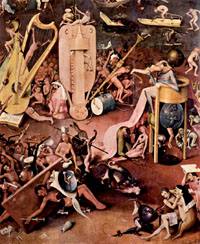
How is Hell?

Europe, 16th century. The Protestant Reformation brought about profound changes in Christianity. But did he change the Europeans' idea of hell? Professor Peter Marshall of the University of Warwick, England, answers this question in his research published in the Journal of Ecclesiastical History.
According to Marshall, at the first glance, Catholic and Protestant theologians had a similar concept of eternal punishment. In fact, the early Protestants did not discuss the subject in depth and often used descriptions of Catholics. For example, the text “lovers of luxury and pleasure will be impregnated with hot alkaterna and smelly sulfur and the envious will be screaming like dogs with the pain of pain” was used by both.
Since the Reformers had abolished the purgatory, hell was the only punishment, and it was therefore imperative for the faithful to be aware of the horrors of the abbey. Thus, as the Protestant Arthur Dent said in 1608, even if all the arithmeticists of the world wrote the longest numbers that they could think of their whole lives and put all the numbers together, the result would be very far from “the time that sinners must spend
suffering torments.” But there were also nuances between the two currents. For Catholics, the flames of hell were real, physical. The Protestants, on the other hand, considered the eternal fire an allegory. According to Thomas Tuk, “if the fire were real, it would require real fuel and when the fuel ran out, the fire would also be extinguished.” Even in terms of the geographical location of Hell, they did not entirely coincide with the Catholics. For the latter, hell was at the center of the earth. In the 16th century, the Spanish priest Alejo Venegas accurately calculated the distance between the earth's crust and hell: The 1,193 lego. The scriptures did not provide detailed information on the page of points, so the Protestants refused to propose a specific physical location.
Therefore, Marshall says, the Protestants more hesitantly addressed the issue and this also influenced the decline of hell in religious thought.
According to Marshall, at the first glance, Catholic and Protestant theologians had a similar concept of eternal punishment. In fact, the early Protestants did not discuss the subject in depth and often used descriptions of Catholics. For example, the text “lovers of luxury and pleasure will be impregnated with hot alkaterna and smelly sulfur and the envious will be screaming like dogs with the pain of pain” was used by both.
Since the Reformers had abolished the purgatory, hell was the only punishment, and it was therefore imperative for the faithful to be aware of the horrors of the abbey. Thus, as the Protestant Arthur Dent said in 1608, even if all the arithmeticists of the world wrote the longest numbers that they could think of their whole lives and put all the numbers together, the result would be very far from “the time that sinners must spend
suffering torments.” But there were also nuances between the two currents. For Catholics, the flames of hell were real, physical. The Protestants, on the other hand, considered the eternal fire an allegory. According to Thomas Tuk, “if the fire were real, it would require real fuel and when the fuel ran out, the fire would also be extinguished.” Even in terms of the geographical location of Hell, they did not entirely coincide with the Catholics. For the latter, hell was at the center of the earth. In the 16th century, the Spanish priest Alejo Venegas accurately calculated the distance between the earth's crust and hell: The 1,193 lego. The scriptures did not provide detailed information on the page of points, so the Protestants refused to propose a specific physical location.
Therefore, Marshall says, the Protestants more hesitantly addressed the issue and this also influenced the decline of hell in religious thought.